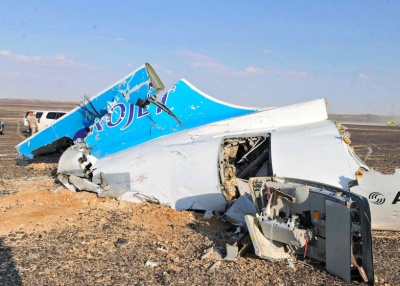Sinai Province

The militant group Sinai Province is currently the most active insurgent group in Egypt. It has been linked to a number of deadly attacks, mostly in North Sinai, but also in the capital, Cairo, and other provinces.
The Islamist group has been active on the Sinai Peninsula since 2011 and was initially known as Ansar Beit al-Maqdis (Supporters of Jerusalem). It changed its name after it pledged allegiance to the Islamic State (IS) group in November 2014. At the start of July 2015, Sinai Province staged a series of attacks against the army, whose scale and complexity observers said indicated the possibility of closer coordination with the IS leadership in Syria.[1]
On 4 November 2015, Sinai Province posted an audio message on terror-related social media accounts claiming that it had brought down the Russian Airbus Metrojet Flight 9268 which exploded over North Sinai on 31 October 2015, killing all 224 passengers and crew on board:
- "Find your black boxes and analyse them, give us the results of your investigation and the depth of your expertise and prove we didn't do it or how it was downed," the message said. "Die with your rage. We are the ones with God's blessing who brought it down. And God willing, one day we will reveal how, at the time we desire."[2]
Aims
Sinai Province is thought to be aiming to take control of the Sinai Peninsula in order to turn it into an Islamist province run by the Islamic State group. The number of active Sinai Province members is believed to be between 1,000 and 1,500. Sinai Province appears to have been operating mainly, but not exclusively, in North Sinai, which has been under a state of emergency since October 2014 when 33 security personnel were killed in an attack claimed by the group. The then Egyptian prime minister, Ibrahim Mehleb, has described the army's confrontation with the group there as a "state of war". North Sinai is thinly populated and generally underdeveloped. Many of the local population are said to feel marginalised and therefore more inclined to be supportive of the militants.
Attacks on Egyptian forces
The border with Israel and the Gaza Strip has been a scene of tension over the past few years. The Egyptian authorities are trying to establish a buffer zone, demolishing houses and digging a trench to prevent smuggling between Egypt and Gaza - which they say is a source of weapons for the militants. The group started by attacking Israel with rockets, but after the removal of Islamist President Mohamed Morsi in 2013 it has focused mostly on Egypt's security services, killing dozens of soldiers.
It has been involved in suicide bombings, drive-by shootings, assassinations and beheadings. In July 2015, the group was seen to widen it tactics, when it said it had attacked an Egyptian naval vessel in the Mediterranean with a missile fired from the shore - a worrying development for shipping in the region. The militants said the attack destroyed the vessel and killed its crew, but Egyptian officials said there were no casualties, contradicting the militants' claim.
While the Sinai Province group has mostly targeted security forces, it has also singled out civilians.
Propaganda
In recent months, there has been a dramatic advance in the group's media and production capabilities. In several videos, Sinai Province has urged citizens to avoid cooperating with the authorities, especially by joining the army and police. In August the group reportedly killed a Croatian engineer who was working for a French energy company in Egypt. Tomislav Salopek was kidnapped while travelling on a road west of Cairo earlier in July. A photograph posted online appeared to show that Salopek had been beheaded. However, the Croatian government said it had not been able to verify his death. The reported beheading of Salopek was most likely aimed at threatening tourists and foreign employees of Western companies.
Western Desert
The Sinai Province group has also expanded its operations outside Sinai, notably in Egypt's Western Desert. The area is popular with tourists for its oases and rock formations, but is also a militant hideout due to its proximity to volatile Libya. In July 2014, the Sinai Province claimed responsibility for attacking an army checkpoint in the Farafra Oasis, near the Libyan border, that left 22 army soldiers dead. In May of the same year, the army said that six of its personnel were killed in an exchange of fire in the same area. It said the attack came in response to a military campaign to hunt down militants in the Western Desert. On 13 September 2014, the militant group said in a statement that it had "resisted a military operation" in the Western Desert. On the same day, Egyptian Interior Ministry said security forces had mistakenly killed 12 people, including Mexican tourists, during an anti-terror operation in the Bahariya Oasis in the Western Desert.